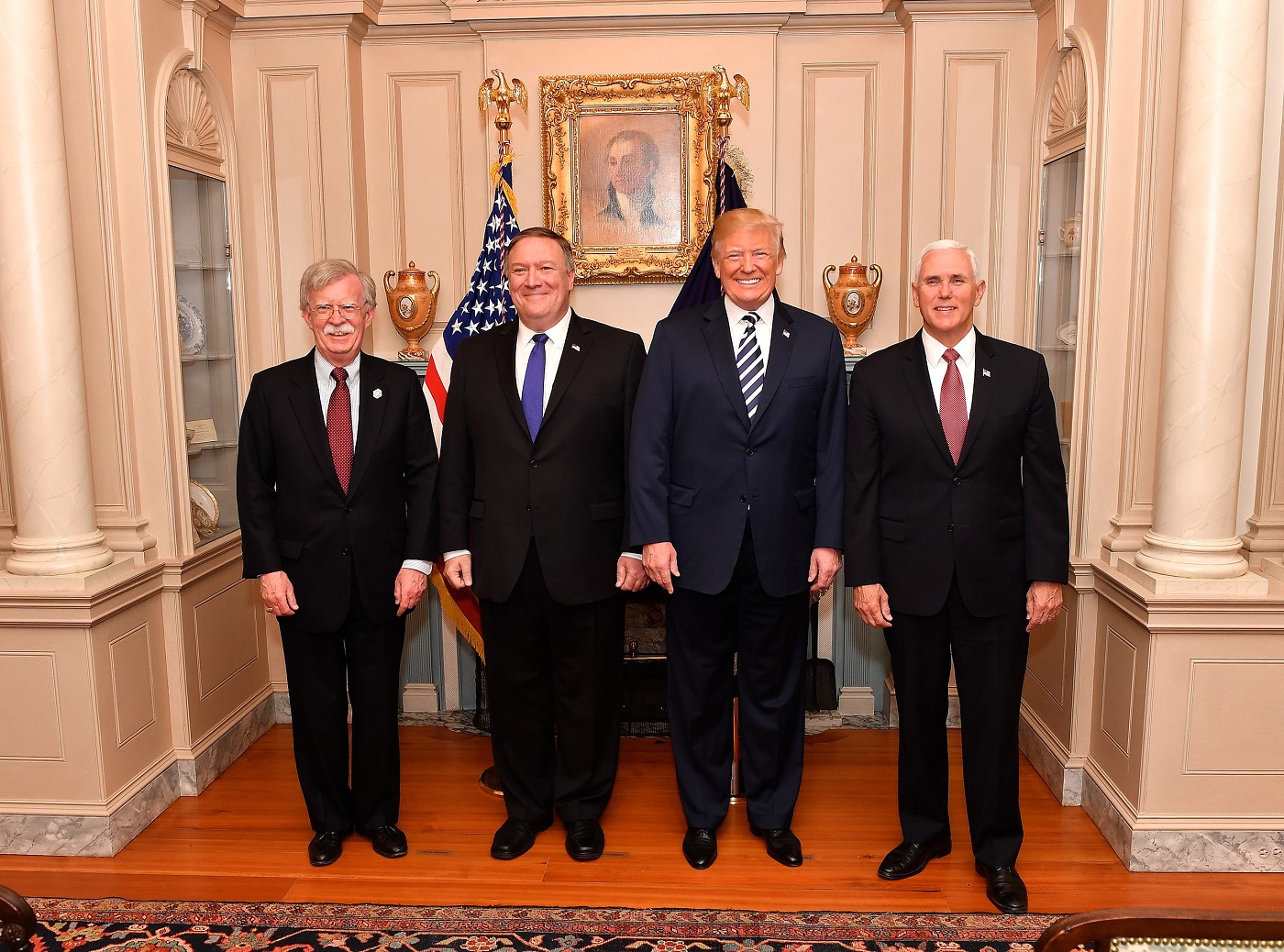
Remember the “weapons of mass destruction” fake news used by the Bush administration to start a war on Iraq in 2003? The Trump administration is trying to stage a similar false flags crisis as a pretext to attack the Islamic Republic of Iran. At the same time, the U.S. has unleashed full economic sanctions on Iran, creating economic hardships that hit the poorest and most vulnerable Iranians the hardest.
Some in the Democratic Party leadership, concerned with getting votes in the upcoming elections, are beginning to raise objections, mostly to the “lack of transparency” and “clarity” of the Pentagon’s spy data. Though this might stay the hand of the Trump administration at the moment, Trump’s overall policy of marching towards war with Iran, and the devastating sanctions it has imposed on the Iranian people, remain unchallenged.
What is going on?
- On May 15, Washington ordered non-emergency staff at its embassy in Baghdad and consulate in Erbil, Iraq to leave the country, citing, a “credible threat” from Iran.
- At a May 9 meeting of top U.S. national security aids, Acting Defense Secretary Patrick Shanahan presented a plan that could send as many as 120,000 U.S. troops to the Middle East should Iran “attack American forces or accelerate work on nuclear weapons.” Trump had said days earlier about Iran “If they do anything it would be a very bad mistake.”
- The Pentagon is sending amphibious warship USS Arlington (LPD-24) and elements of the 22nd Marine Expeditionary Unit to join the Abraham Lincoln Carrier Strike Group near Iran.
- Washington has declared Iran’s Islamic Revolutionary Guard Corps a terrorist organization, the first time a part of any government has been so labeled. All of this is in response unsourced and non-specific “indications of heightened Iranian readiness to conduct offensive operations against U.S. forces and our interests,” according to a Pentagon statement.
Rattling his saber, U.S. National Security Advisor John Bolton called the U.S. buildup an “unmistakable message” that the U.S. is prepared to unleash “unrelenting force” in response to any provocation. Secretary of State Mike Pompeo echoed the threat promising a “swift and decisive” response to an attack by Iran – or its proxies.
Bolton: Architect of weapons of mass destruction sham
But there is no Iranian provocation. No other government sees an Iranian threat. On the contrary, British Maj. Gen. Chris Ghika, deputy commander of the U.S.-led coalition fighting the Islamic state, said on May 14, “No, there’s been no increase threat from Iranian-backed forces in Iraq and Syria.” Iraq officials expressed skepticism of any hightened “threat.” European allies are calling recent Iranian military moves “defensive.”
This is a U.S. manufactured crisis, and poses a great danger. Such false flags were used by the U.S. as pretexts to enter the Spanish American War (Remember the Maine), to start the war against Vietnam (falsified attack on a U.S. ship at the Gulf of Tonkin), and to begin the 2003 war on Iraq based upon nonexistent “secret” information that then Iraqi head of state Saddam Hussein was amassing weapons of mass destruction.
John Bolton, widely recognized as the force behind Washington’s current Iran policy, should know. This super hawk was a key propagator of false news in the weapons of mass destruction hoax. While serving as George W. Bush’s undersecretary of state for arms control and international security, he declared in 2002: “We are confident that Saddam Hussein has hidden weapons of mass destruction and production facilities in Iraq.”
US renewed oil sanctions to ‘bring Iran to its knees’
Washington is also turning the economic screws on Iran. This month, Washington ended waivers that allowed some countries to buy Iranian oil despite the U.S. embargo on Iran’s oil and banking sectors. This is part of the Trump administration’s arrogant and imperialist “maximum pressure campaign” to “reduce Iranian oil exports to zero” and bring this sovereign nation “to its knees.” Oil and gas are the lifeblood of Iran’s its economy and accounts for 80 percent of its exports.
This month the U.S. also imposed additional sanctions on that country’s steel, aluminum, iron and copper industries, which account for a tenth of Iranian exports.
Last November, the U.S. demanded that everyone in the world stop importing Iranian oil, or else face sanctions from the United States. But these included some U.S. allies. China, Turkey, India, Japan, south Korea, Taiwan, Turkey, Italy and Greece were given six month waivers to gradually wean themselves from Iranian oil. China and India were Iran’s biggest customers.
The waivers expired May 1, meaning the sanctions will come into full force, and the U.S will start sanctioning countries for buying Iranian oil. The move to choke off all exports is designed to force political change in Iran, and to get the Islamic Republic to stop supporting other independent government and liberation struggles in the Middle East against aggression from U.S. imperialism, Arab reaction regimes and Israel.
Sanctions designed to hurt Iranian people
Sanctions are a weapon of war, especially targeting the most vulnerable. Sanctions against Iraq after the first gulf war resulted in the death of more than 500,000 children. In Venezuela,, where U.S. sanctions have caused the death of as many of 40,000 people in Venezuela since 2017.
While the Trump administration, especially its loudest anti-Iran voices, Pompeo and Bolton, frame their rhetoric that the sanctions are meant to “help” the Iranian people, sanctions really target them. The sanctions are collective punishment against the entire Iranian population meant to cause so much hardship that Iranians will turn against their government so they can get some relief.
On May 11, Iranian President Hassan Rouhani compared the impact of the American sanctions to the devastation of the Iran-Iraq war in the 1980s, the very lowest point of Iran’s economy to date. There is rampant inflation and the currency has been devalued, with the Iranian rial, which traded at 32,000 to $1 at the time of the 2015 nuclear accord, traded on May 16 at 147,500. The cost of everyday goods is going up, the cost of living is increasing, causing immense economic hardship in Iran.
Nuclear threat come from US and Israel
Iran has been so hyped by U.S. administrations and the corporate media as a “nuclear threat” that it may be hard to remember that Iran has never had nuclear weapons.
The only country with nuclear weapons in the Middle East is Israel. This is truly a rogue regime, which has killed hundreds of thousands of Palestinian and other Arab civilians in its 71 years existence.
The other nuclear threat in the Middle East comes from the Pentagon. Washington has Iran surrounded by military bases, and scores of naval ships prowl waterways close to Iran. All of these can launch nuclear weapons Meanwhile, there are no Iranian bases on foreign soil, and certainly no Iranian missile batteries on the Canadian and Mexican borders pointed to the U.S., or Iranian ships threatening American borders.
US sanctions pressure Europeans
Nor has Iran violated the nuclear accord. Washington is the only government which has violated the 2015 Joint Comprehensive Plan of Action (JCPOA)–by leaving the agreement unilaterally and by re-imposing sanctions on Iran. The rest of the powers that negotiated the Iran nuclear deal— the European Union, Germany, France, the UK, Russia and China and Iran– still honor it. Iranian compliance with the nuclear agreement has been confirmed in every report by the International Atomic Energy Agency since the report was implemented in 2016. US intelligence committee also confirms Iran’s adherence.
However, Iranian President Hassan Rouhani recently said that the 2015 nuclear deal is “on life support.” This is because U.S. sanctions are not only aimed at Iran, but also meant to scuttle the whole accord by intimidating the European partners from honoring the provision of accord that says they will trade with Iran if it is adherent. The Europeans and other powers have been looking for ways to get around the U.S. sanctions but, bullied by Washington, they are dragging their feet.
Iran’s Foreign Minister Mohammad Javad Zarif has pointed out that, as part of honoring their commitments to JCPOA, the Europeans were required to set up a non-dollar direct payment channel with Tehran to facilitate Iranian oil imports by circumvent the U.S. financial system and other banks that would be vulnerable to sanctions. This Instrument in Support of Trade Exchange (INSTEX) is part of the European commitments under JCPOA following Washington’s withdrawal from the nuclear accord, according to Zarif. INSTEX, however, is still not operational. Iran has repeatedly complained about postponements and delays, which appear to be political in nature.
With all U.S. sanctions re-imposed, and without the European trade, Iran has now lost all the economic benefits that the nuclear deal gave it, and has very little reason to stay in the nuclear deal. The Trump administration, however, is poised to bait Iran should it leave the nuclear deal, and then use this as an excuse to further escalate its aggression.
Democrats put up mild opposition
Leading Congressional Democrats have expressed opposition to an attack on Iran at this time. But their May 16 statements, were mostly limited to questions regarding the Pentagon’s spy data. House Speaker Nancy Pelosi questioned its “lack of transparency,” and New York Senator Chuck Schumer objected to “an alarming lack of clarity.”
The Obama administration considered the nuclear accord with Iran to be its signature foreign policy accomplishment. This does not mean, however, that the Democratic Party leadership has any interest in putting the pieces of the accord back together again or in silencing the drums of war that the Trump administration has beaten since it came into office. Schumer and Pelosi, for example, have been strong backers of Trump’s overall policies in the Middle East, and have ties to the military industrial complex that profits from war.
But working class and poor people here have no interest at all in supporting new acts of aggression or tolerating old ones—military and economic—against Iranians or any other people, and certainly no interest in fighting and dying in yet another war for oil.
The same forces in Washington imposing sanctions on Iran are cutting back social services here. It’s time to get the U.S. military out of the Middle East, leave the people there to determine their own lives, and use the money instead to meet human needs at home. It’s time for a new, working class anti-war movement.





